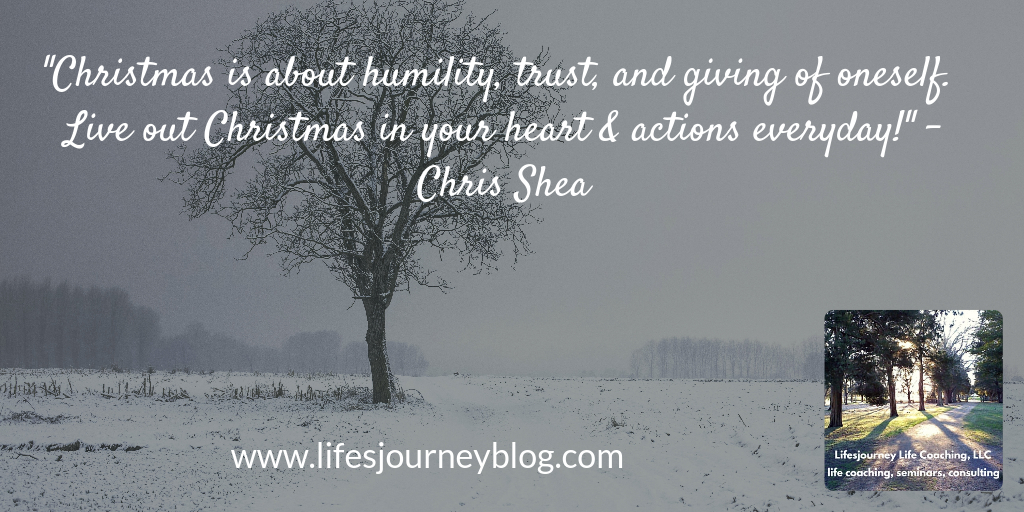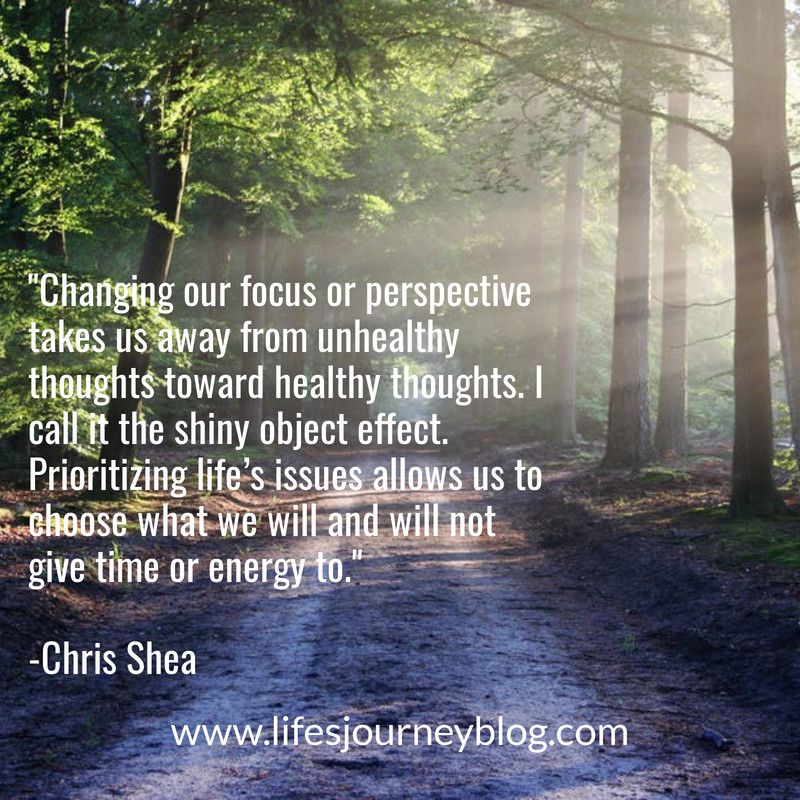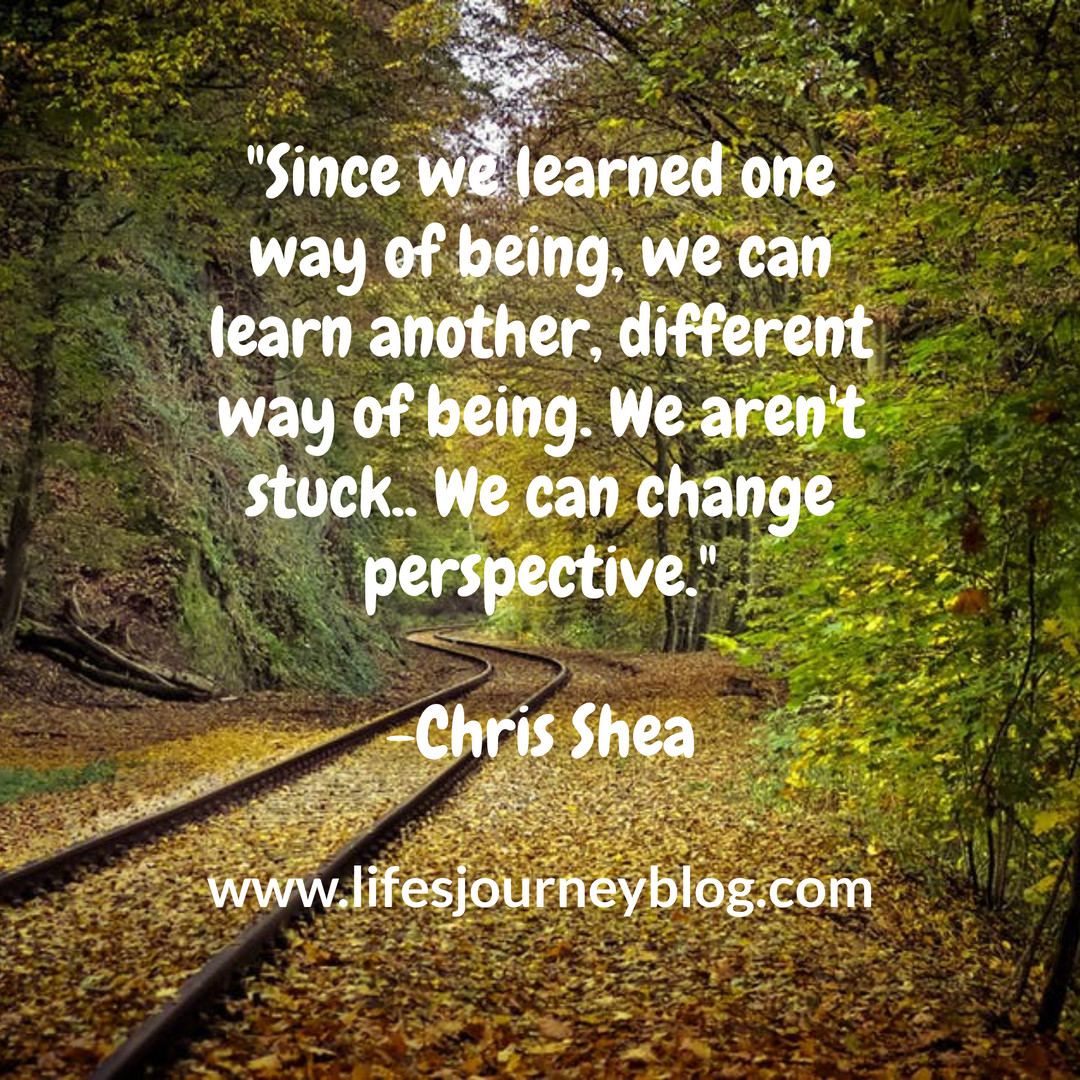Posts Tagged ‘change perspective’
Changing Perspective On The Holiday Season
Changing perspective on the holiday season is so crucial for us in finding happiness and peace. The stress and busyness of the holiday season have me reflecting on the topic of keeping perspective on the holidays. If I change how I think about, or view, the holidays, then how I view and cope with the stress of the holidays will change.
(This article is based on a transcript from my podcast episode posted December 21, 2019)
When I talk about the holiday season, I’m not talking in any particular religious meaning. Regardless of your belief or how you celebrate this time of the year, the fact remains this a very hectic time. In changing my perspective on the holiday season, namely, my expectations will change how I view the season, and so reduce my stress.
Expectations
Many of us have expectations of what this time of the year should be. Families and our traditions place these expectations upon us. So when we’re looking at these expectations it puts a high level of achievement, a high level of making sure that what we do equals previous years’ celebrations.
Expectations on celebrating and honoring one’s traditions is a worthy goal to have as long as it is a realistic goal. When I talk about perspective maybe we need to shift our thoughts and views about some of our traditions in our approach to this season to give it a whole different perspective. I know this time of the year there’s talk about getting away from the commercialization of the season. I agree that as a society, we’ve allowed the holidays to become consumerism focused.
Consumerism
When you think about it, the consumerism of the holidays tends to give us stress! So it begs the question, what is the real meaning of the holiday season? Since there are many different cultures and religious traditions that celebrate this time of the year, let’s examine the purpose of the season in a very large and general picture.
The holiday season was meant to be, from its inception, a time to spend with family, with loved ones, and a time to take stock of what life really means. Given the longer nights of the Winter season, this is a perfect time for us to take stock of our lives.
Yet, as the Winter progresses, the days get a little bit longer as we experience a little bit more daylight each day. This little bit of sunlight each day gives us hope. This sense of hope impacts our perspective and any changes we wish to make about it.
If my perspective on the holiday season is based solely on appearances, decorations, parties, gifts, etc. as the only meaning of this season, then my view, shaped by society and tradition, places such a demand (expectation) on me that my stress will be high. So how do I lower my stress? Change my perspective on the holiday season. To quote the Grinch, “maybe Christmas means a little bit more.”
Perspective Shift
So what is important to you in life? Is it appearances and material goods? Or maybe it’s family and close friends. If I can focus on the importance of love of family and friends, then the rest of the” things” of the season aren’t as important. I’m not saying that we get rid of all consumerism, but what is your priority this time of the year? What in life genuinely makes you happy, peace-filled, and feel loved?
Surrounding oneself with loved ones while celebrating your togetherness is relatively stressing and expectation free. It’s only you being yourself, knowing you’re respected and honored simply for you being you. It can’t get much better than that.
Now imagine a holiday focused on the expectation of pleasing and impressing those same people. The more you believe, the more your stress increases as you think of all that has to now be accomplished and done with perfection. Which scenario do you choose?
Consumerism grows as material goods build upon material goods. You purchase one item, but now you need some of the accessories, and some of those need special connectors and cords. Now you’re buying more and more, and needing to carry with you more and more things. See, all of these things build upon each other so that one material good equates to many more material goods, If we’re looking for a way to find some peace in our lives begin to change your perspective and declutter. I’m not advocating that we get rid of all of our material goods, but to re-examine the products we already possess.
As an example, I turn to one of the persons in history who inspires me; Saint Francis of Assisi. He was a Catholic preacher and monk back in the 1100s and 1200s who gave up everything he owned to live a life of complete poverty and ministry to others.
As Francis’ reputation for caring and compassion spreads throughout the area, other men decide to follow Francis, and they too give up everything they own. Francis and his followers are proud of their accomplishments in ministry due to their freedom in not owning possessions.
On one occasion, it’s documented that some of the Brothers asked Francis if they could purchase an educational book for all of the brothers to use. Francis himself was not against learning, but he uses the opportunity to explain to them the importance of not gathering material goods. Francis replies by asking if we get a book where we going to store that book? We need a place to store the books so that the book stays safe. So we’re going to have to build a building. Yet if we build a structure to put the book in we’re going to have to make sure that when we’re not around, that book remains safe, so we may have to put some locks on that building.
And then once we put the locks on the building, people will get suspicious of what’s in a locked building that we may have to hire some people to keep an eye on that building. Francis’s point being is this one book; this one material object is causing them to build a structure that will need to be secured.
Francis’ other lesson in his response to the Brothers pertains to one’s focus and priorities. If the book were in the guarded building, how focused would the Brothers be on the ministry to others versus on the status and care of the book? The takeaway from the story is not that Francis is anti-education, but that Francis wanted his Brothers to be wholly and entirely focused on serving God without any other care or stress. In other words, a perspective shift on the meaning of material goods.
Place Francis’s story into your modern life. Think of the material goods we have. Is it not true that once we obtain an object that it might mean we accumulate other objects to go along with that object and/or the debt of the object(s) indicating the longer, we may have to work, taking us away from our family. Yet honestly, what’s more, important to us; those goods we’re working for or our family?
The Challenge
My challenge for all of us is to refocus our lives on those things which are meaningful to us. Then examine what our priorities are now. If my priorities are causing me stress and defocusing me from my priorities, then what changes in my life do I need to make to realign my priorities and my life?
So that’s my challenge for us during this holiday season, to change your perspective so that your priorities in life match your actions such that you find hope and enjoy peace this holiday season.
{loadmoduleid 140}
An Expert Life Coach Shares Successful Ways to Change Perspective
Many of us are negatively bothered by the small annoyances in life. Expert life coach Chris Shea shares his successful way to change perspective and live happier.
It’s usually not the big things that affect us as much as the accumulation of these daily small annoyances. We find ourselves lashing out in anger or snapping at others for what they may feel is a small matter, but you are really lashing out not over that issue specifically, rather you are reacting to an accumulation of small issues.
When my clients complain about issues in their life, regardless of my opinion, I try to refrain from labeling it “the small stuff”. If something is bothering someone I don’t want to say “small stuff” as that negates what they’re feeling. Although, I hope to get them to a point when someday in the future they can recognize the current issue was something small and can be now laughed at.
To get to that point of laughing at ourselves over the small stuff one of the questions that I’ll ask my clients is, “in the scope of everything going on in your life and in the world right now, where does this fit?” The question is an attempt to change perspective and put into focus that which is truly important in life.
When we get mentally stuck focused on what is truly a small matter, we need to divert our attention to refocus on something else. Eventually, you’ll forget what you were previously focused on. This helps to reframe our perspective. It’s like a laser pen for cats, keeping their attention focused on a point, not on anything else. We, as humans, act and react the same way a cat does with the laser pointer.
I’ve spent over 20 years working with people suffering from addictions to later work on their recovery while learning how to cope with cravings for their drug of choice. One of the complaints I frequently hear from my former clients is about their sponsor/mentor in guiding them through a craving. They complain to me that when they would be having a craving they would call their sponsor and say “I’m having a craving” and the sponsor would reply “hey did you watch the game last night?”
Bonus: Download Chris Shea’s booklet on Life Coaching & is it for me? Click here to get it
The former client would be dismayed that their sponsor only wanted to talk about the game instead of the craving. They would wonder what’s wrong with their sponsor that they wouldn’t talk about the craving? They’ll suggest to me that they need a new sponsor who cares for them and not some game.
My question to this person in recovery, after listening to their story, is always “well did you use last night?” “No”, they would reply. To which I state “isn’t that the goal you were going for, not using?”
If I have a headache and I focus on my headache then my headache gets worse. If I do what I need to do to take care of that headache and then do something else, my headache seems to get better or even goes away. Changing our focus or perspective takes us away from unhealthy thoughts toward either healthy or neutral thoughts. I call it the shiny object effect. If your cat or dog (or even young child) is fixated on something you don’t want them to be fixated on, simply flash a shiny object and their fixation changes to the new object. You can do this literally or figuratively with yourself and other humans.
Changing perspective helps us understand that some of life’s issues are small and not worth our time, energy, or negativity. Distracting myself from the small issue is but one aspect of coping with the small stuff; understanding and coping with the idea that it’s a small issue is vital.
Prioritizing life’s issues allows us to choose what we will and will not give time or energy to. If the issue, in the scope of what’s happening in the world, won’t make a difference, then let it go. If the issue rises to the level of needing to be addressed, then do so in a healthy, conscious, and productive manner.
{loadmoduleid 140}
How To Change My Perspective And Be Happy
Over the years I’ve come to the realization that my perspective is a point of life we don’t think of. Yet, perspective influences and dictates how I feel and act.
It’s all about my perspective! I feel that we are challenged to understand that the way we view or perceive the world around us is directly related to how we see ourselves. If I have low self-esteem or do not consider myself in a positive way, how can I view my relationships, work, and my community in any way but negative? Sure, I can fake it, and many people will believe the lie I tell them (and the lie I tell myself), but we know the truth.
During my undergraduate studies, I had a professor who was very knowledgeable in his field yet was quite miserable in his life. If you met him while you both were getting the morning coffee and were to say to him “good morning!”, his response would always be “don’t tell me what kind of morning to have!”
Bonus: Chris Shea is offering this free GIFT explaining how you can improve your life with life coaching! Click here to get it
In varying degrees, we’ve all felt similar to that professor. We can’t fathom a “good” morning or a beautiful day, or success. Why? Because we don’t feel it within us. We feel lost, unloved, anxious, that the world is against me. Those feelings are my perception, and that perception influences how we view our external world. My perception becomes, and indeed is, our reality.
Reality, philosophically and experientially, is not widely understood. I’ll stay away from a philosophical discussion of reality, except to reiterate that our experience of reality is based on our perceptions. None of us see or experience the world in precisely the same way as anyone else experiences it. Our existence, as it is experienced by each of us, at this moment, is based on how we feel about ourselves and what we have learned up to this moment.
All of our past experiences have taught us lessons. Every choice you made, with it’s resulting consequence, showed you to either make that choice again or to make a different decision in the future. Everything you was directly or indirectly told by family, friends, co-workers, colleagues, etc., have influenced you, coupled with your choices and experiences. Everything which has happened to you up until this moment has, in a significant way, affected who you are right now!
Therefore, in a real way, we are a product of our history. This is why I often say that the purpose of the past is to learn from it rather than dwell on it. Since we are products of our past decisions and actions, the theory is correct that if we don’t like who we are today, all we need to do is make different future choices and take different future actions. In other words, make a perspective shift.
Since we learned one way of being, we can learn another, different way of being. We aren’t stuck. We can change perspective.
Through our experiences, we not only learned ways to act, but we also learned ways to think. If the experience was not emotionally pleasant, or an experience we want to forget, we learned what is called “distorted” thoughts, or “irrational” thoughts.
The reason we call specific thoughts distorted or irrational is that these thoughts do not deal with reality, nor do they lead us to happiness or inner peace. When traumatic experiences happen to us, our emotional response is to protect oneself. How we protect oneself is by skewing, in our mind, the reality of the event so that it becomes a “reality” we can cope with. In other words, it becomes my perspective. This new reality is different from the reality we are experiencing so that we can better deal with life. The coping mechanism itself is not harmful as it allows us to cope during the emotional experience, but if we continue to view our world in this skewed way we no longer interact with the world as it is, but as we perceive it to be, in my perspective. Therefore, we call these thoughts distorted or irrational thinking.
Identifying and understanding the origin of your distorted thinking allows you to reframe and change your thoughts to those which are healthy and will lead you to happiness and inner peace. We need to change perspective. Our life’s challenge is to stay focused on the present moment, non-judgementally, feeling what it is we are meant to feel at this moment, then making decisions which will lead us to a healthy way of coping with life; a perspective shift.
How do I know that I am coping healthily? Your thoughts and your actions will lead to resolution of your issues, and you will begin to feel inner freedom and peace for which you have longed. Then you will know that you are healthily coping with life.
{loadmodule mod_custom,continue the conversation here or on social media}



